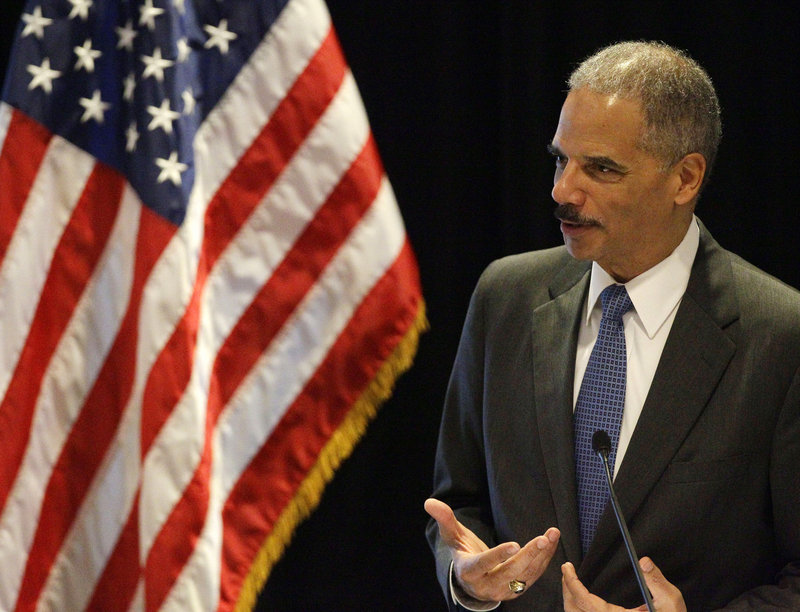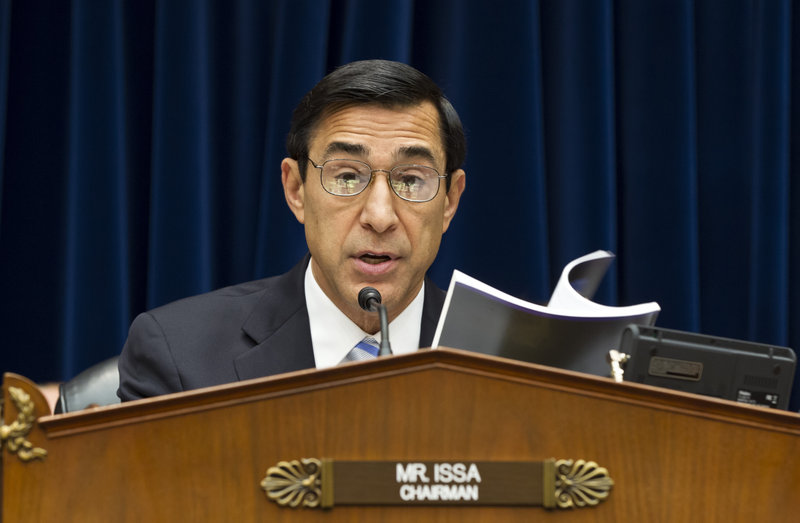The debate will be explosive Thursday when the House of Representatives decides whether to hold Attorney General Eric Holder in contempt of Congress. What happens next could be the opposite – a long, arduous legal struggle over the roles of the executive and legislative branches.
The vote will trigger a new chapter in the long clash between the branches over executive privilege, a battle that’s almost as old as the nation. President Obama is using executive privilege to shield the Justice Department from a subpoena for emails sought by congressional investigators looking into the Operation Fast and Furious gun scandal.
Republicans, like their congressional predecessors since the founding of the nation, aren’t buying it.
“Please clarify the question raised by your assertion of executive privilege,” committee chairman Darrell Issa wrote Monday to Obama. “To what extent were you or your most senior advisers involved in Operation Fast and Furious and the fallout from it?”
White House spokesman Jay Carney insisted Tuesday that the Justice Department still is trying to resolve the dispute.
“And if the Republicans decide not to have this be a purely political issue, we think that this could very easily be resolved,” Carney said. “But it has not been resolved yet, and I think that points to the obvious political nature of this effort by House Republicans.”
Republicans aren’t saying precisely what would happen after the contempt vote.
The contempt citation could be sent to Holder’s Justice Department, where the U.S. attorney for the District of Columbia could send the issue to a grand jury.
But the history of these affairs suggests several possible paths for the citation once it leaves Congress: It could get entangled in lengthy legal maneuvering, and it could get resolved outside a courtroom.
Some experts argue the idea that executive privilege is less crucial to presidents nowadays.
Louis Fisher, a retired constitutional law specialist at the Law Library of Congress, noted that Holder has said releasing documents would “inhibit the candor” needed in executive branch deliberations.
“This popular argument is vastly overplayed,” Fisher said. “Nothing prevents executive officials from speaking frankly and honestly to agency heads.”
Such arguments have grown weaker in recent years, Fisher said. “Presidents, including George W. Bush and Barack Obama, work closely with the press to explain how decisions on national security and domestic policy are reached,” he said.
Authors such as Bob Woodward wrote books about Bush and Obama “letting us know what was said in the highly confidential Situation Room about presidential decisions to commit troops to Iraq and Afghanistan,” Fisher noted.
If executive privilege faces a rocky legal road, Congress also faces historic obstacles in making the contempt charge stick.
“A number of obstacles face Congress in any attempt to enforce a subpoena issued against an executive branch official,” said a report last month from the nonpartisan Congressional Research Service. “Efforts to punish an executive branch official for non-compliance with a subpoena through criminal contempt will likely prove unavailing in many, if not most, circumstances.”
In the Reagan administration, the Justice Department maintained that a U.S. attorney is not required to refer a contempt citation to a grand jury “or otherwise to prosecute an executive branch official who is carrying out the president’s direction to assert executive privilege,” the report said.
The memo was written by Reagan administration officials after a struggle over Congress’ vote to cite Environmental Protection Agency Administrator Anne Gorsuch Burford in contempt for withholding documents related to the Superfund program. Justice filed suit, saying the House action was an “unwarranted burden on executive privilege” and interfered with the executive branch’s ability to carry out the law. A federal district court dismissed the suit, saying it should not get involved in a legislative-executive branch dispute until all avenues for a possible settlement have been resolved.
Justice did not appeal the decision, resumed talks and eventually the documents were released to Congress.
In the George W. Bush administration, the House voted contempt citations against White House Counsel Harriet Miers and chief of staff Josh Bolten in connection with the firing of U.S. attorneys. But the Justice Department quickly said it would not bring contempt citations before a grand jury, so Congress went to court and got a ruling that the immunity claim is “entirely unsupported by existing case law.” The court also warned immunity could be invoked, saying Miers could claim executive privilege in certain circumstances.
Two months after Bush left office, the two sides reached a settlement.
Copy the Story Link
Send questions/comments to the editors.




Success. Please wait for the page to reload. If the page does not reload within 5 seconds, please refresh the page.
Enter your email and password to access comments.
Hi, to comment on stories you must . This profile is in addition to your subscription and website login.
Already have a commenting profile? .
Invalid username/password.
Please check your email to confirm and complete your registration.
Only subscribers are eligible to post comments. Please subscribe or login first for digital access. Here’s why.
Use the form below to reset your password. When you've submitted your account email, we will send an email with a reset code.